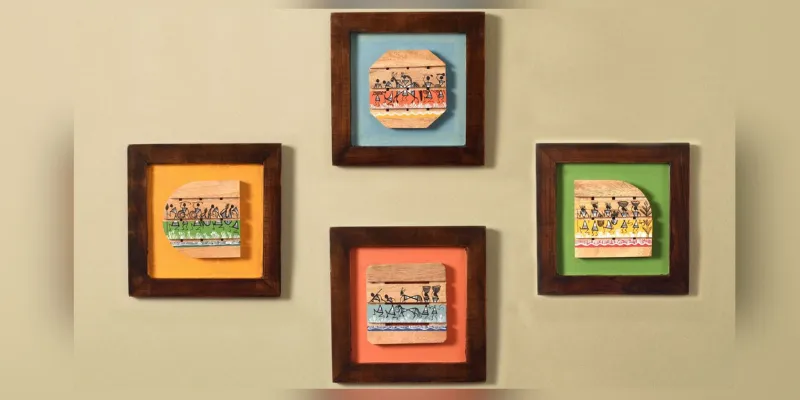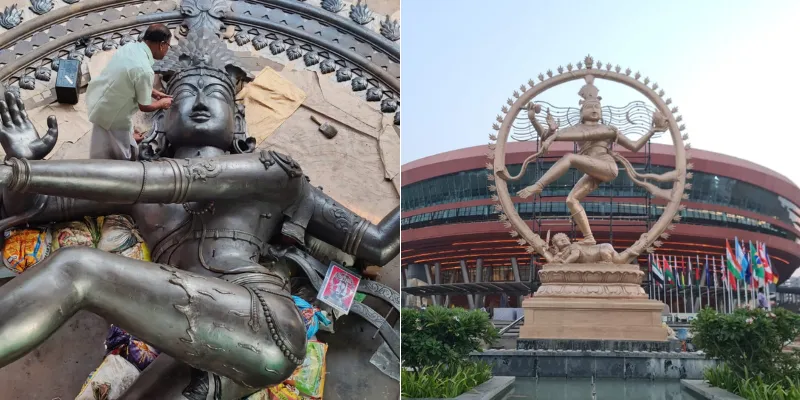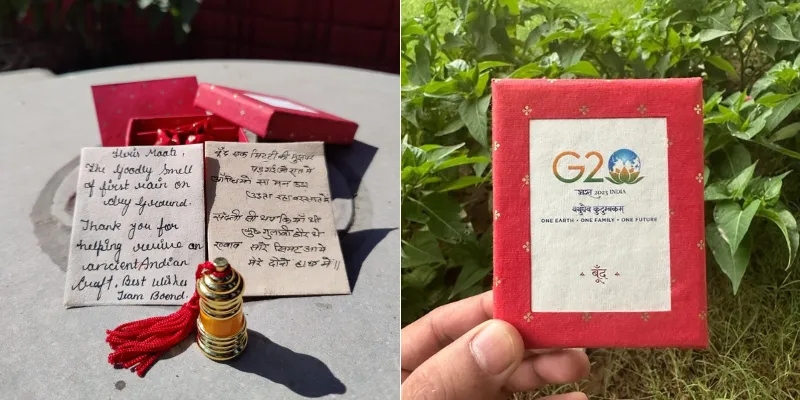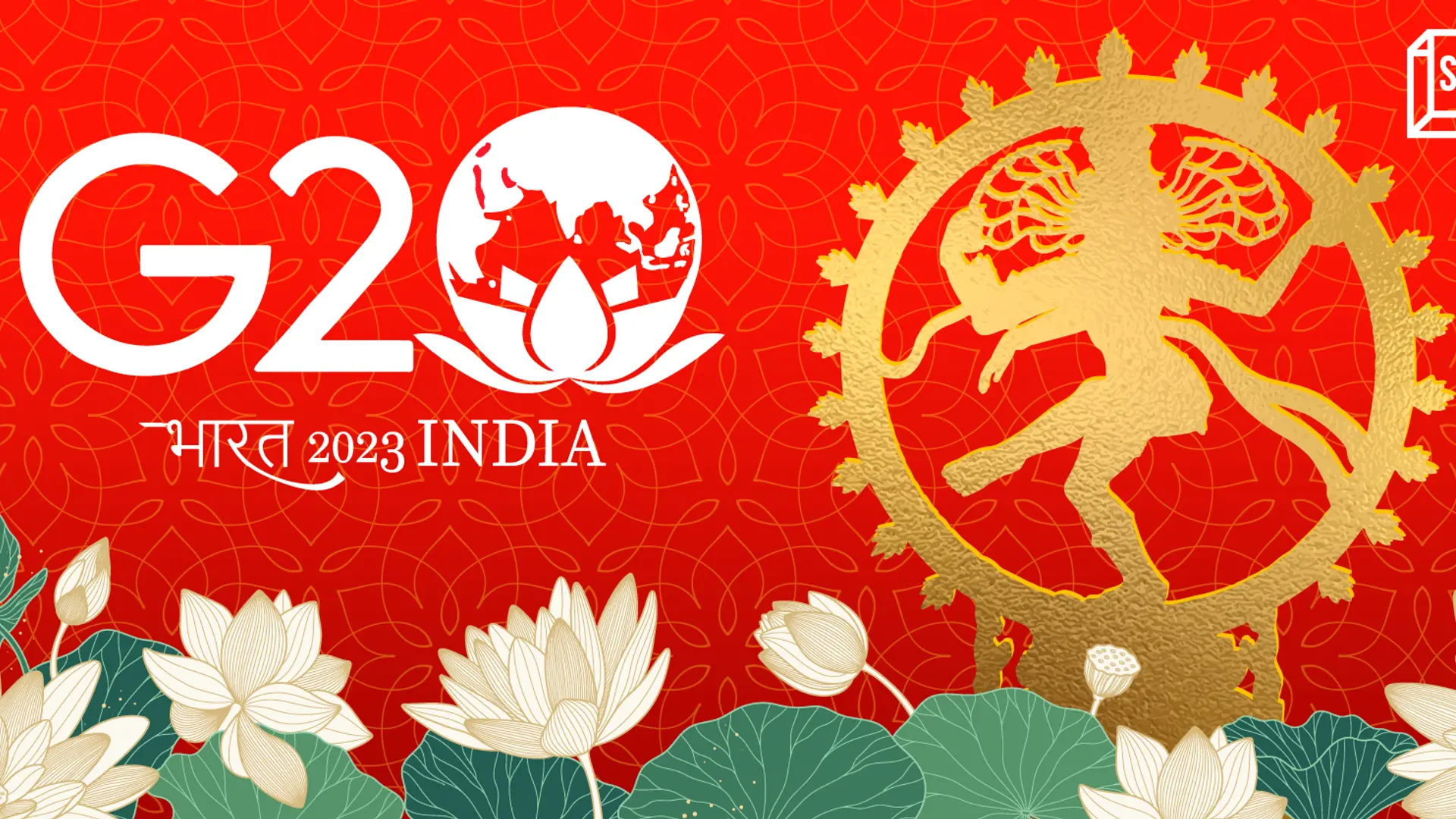How MSMEs and homegrown businesses added colour and flair to the G20 summit
Nearly 200 artists and traditional homegrown businesses showcased their products to world leaders and foreign delegates at the G20 summit, creating new avenues for global trade.
From Kashmir’s Pashmina shawls to Puducherry’s terracotta handicrafts, from Odisha’s Pattachitra paintings to Paithani sarees and Kolhapuri slippers of Maharashtra, and more, India’s rich art and crafts were on full display at the recently concluded G20 summit in New Delhi.
Nearly 200 artists and traditional homegrown businesses proudly showcased their products to world leaders and foreign delegates, thus adding colour and flair to the event and gaining global recognition.
According to the exhibitors and participating enterprises, the G20 summit's success has created new avenues to facilitate global trade and given a fillip to MSMEs (micro, small and medium enterprises).
Suman Sonthalia, Founder of Delhi-based Aakriti Art Creations—one of the gifting partners at the G20 event—expresses her pride in India hosting the gigantic summit, which she believes has provided recognition to Indian arts, crafts, and culture.

Warli art paintings by Aakriti Art Creations
Sonthalia, who specialises in Warli art, says the government commissioned 200 art pieces from her company, consisting of sets of four each, to present to international delegates.
With Vasudhaiva Kutumbakam as the motto, the momentous gathering not only marked a significant milestone in India’s ascent in the global arena but also celebrated the country's warm hospitality.
During the event, the government unveiled and presented commemorative silver coins to the guests, produced in collaboration with India Government Mint in Kolkata.
Dr Amushree Jha, Co-founder of Delhi-based DIVINITI —the official gifting partner for Rashtrapati Bhavan—collaborated with the government body to co-design the frames that accompanied these mementoes.
“The G20 summit will go a long way in helping the MSME sector. The joint statement, which was unanimously passed by all participating countries, has a separate agenda specifically to address the challenges faced by this sector worldwide. The MSME sector, particularly from our country, shall be hugely benefitted, as this declaration was made under India’s presidency,” says Jha.
Krati Tandon, Co-founder of Kannauj-based Boond Fragrances—also one of the gifting partners at the event—says the order received from the government gave a boost to her business.
“It is not easy for a young business like us to reach that kind of audience, and it was only possible because the government wanted to showcase the real India, and we are thankful,” she adds.
Araku Coffee, Sundarbans JFMC, Pashmina.com, and Pekoe Tips Tea were among the other gifting partners at the G20 summit.
That’s not all. The summit also featured a 28-foot Nataraja statue, installed at the Bharat Mandapam, the official venue for the event.
The statue was built by Srikanda Sthapathy from Swamimalai, a panchayat town in Thanjavur district of Tamil Nadu.
“This is the world's largest Nataraja statue made in single casting using traditional methods. At 18 tonnes, the statue is 28-foot high and 21-foot wide, made for Rs 10 crore in six months. This is unbreakable and cannot be easily damaged,” says the artist.
Sthapathy comes from a family of sculptors who have been practising the art for several generations. He learnt this art from his father.
There are over 600 sculptors residing in his village, which houses about 100 statue factories, says Sthapathy.
The Nataraja statue—which is in the Ananda Thandavam pose (the ecstatic dance of Lord Shiva where he stands on one leg)—took three days to reach Delhi, where 25 sculptors from Sthapathy’s village did touch-up and installed the statue at the venue’s entrance.
“Many experts and engineers visited the place and asked us about the stability of the statue to stand on one leg and checked it thoroughly. They were happy about the way we had made it without engineering knowledge,” Sthapathy elaborates.

The Nataraja Statue at Bharat Mandapam
The man behind Bharat Mandapam’s architecture was Sanjay Singh, Director of Arcop Associates Pvt Ltd, who told The Sunday Guardian that the venue was conceived as a representation of India's rich culture and craftsmanship, with the dedicated efforts of numerous artisans.
“With this summit, our aim was to create an architectural masterpiece that symbolises India's modern architectural prowess while staying deeply rooted in its heritage,” he said.
The Craft Bazaar within the Bharat Mandapam featured artisans from every Indian state and union territory.
Sonthalia of Aakriti Art Creations explains that the government carefully chose the artisans based on their experience and accomplishments to showcase the best of Indian arts to the guests.

Boond Fragrances Maati
Meanwhile, the gala dinner hosted by President Droupadi Murmu was a unique dining experience for the foreign dignitaries, who were served meals on silver and gold-plated utensils. And, Iris Jaipur—a silverware and metalware family business spanning three generations—left no stone unturned to add to the pomp and show.
There’s no doubt that Indian small and medium-sized enterprises added to the appeal of the G20 summit, underscoring the significant potential of smaller businesses to play a pivotal role in the success of grand events like these in the future.
(The copy was refreshed with an updated headline.)
Edited by Suman Singh



